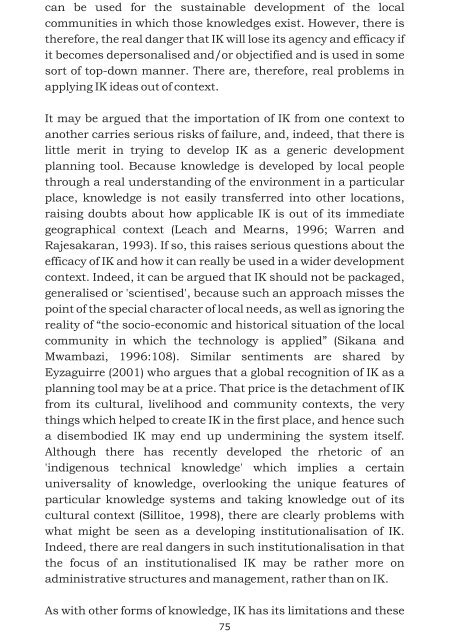Beneficiaries are actors too.pdf - Southern Institute of Peace ...
Beneficiaries are actors too.pdf - Southern Institute of Peace ...
Beneficiaries are actors too.pdf - Southern Institute of Peace ...
You also want an ePaper? Increase the reach of your titles
YUMPU automatically turns print PDFs into web optimized ePapers that Google loves.
can be used for the sustainable development <strong>of</strong> the local<br />
communities in which those knowledges exist. However, there is<br />
therefore, the real danger that IK will lose its agency and efficacy if<br />
it becomes depersonalised and/or objectified and is used in some<br />
sort <strong>of</strong> top-down manner. There <strong>are</strong>, therefore, real problems in<br />
applying IK ideas out <strong>of</strong> context.<br />
It may be argued that the importation <strong>of</strong> IK from one context to<br />
another carries serious risks <strong>of</strong> failure, and, indeed, that there is<br />
little merit in trying to develop IK as a generic development<br />
planning <strong>too</strong>l. Because knowledge is developed by local people<br />
through a real understanding <strong>of</strong> the environment in a particular<br />
place, knowledge is not easily transferred into other locations,<br />
raising doubts about how applicable IK is out <strong>of</strong> its immediate<br />
geographical context (Leach and Mearns, 1996; Warren and<br />
Rajesakaran, 1993). If so, this raises serious questions about the<br />
efficacy <strong>of</strong> IK and how it can really be used in a wider development<br />
context. Indeed, it can be argued that IK should not be packaged,<br />
generalised or 'scientised', because such an approach misses the<br />
point <strong>of</strong> the special character <strong>of</strong> local needs, as well as ignoring the<br />
reality <strong>of</strong> “the socio-economic and historical situation <strong>of</strong> the local<br />
community in which the technology is applied” (Sikana and<br />
Mwambazi, 1996:108). Similar sentiments <strong>are</strong> sh<strong>are</strong>d by<br />
Eyzaguirre (2001) who argues that a global recognition <strong>of</strong> IK as a<br />
planning <strong>too</strong>l may be at a price. That price is the detachment <strong>of</strong> IK<br />
from its cultural, livelihood and community contexts, the very<br />
things which helped to create IK in the first place, and hence such<br />
a disembodied IK may end up undermining the system itself.<br />
Although there has recently developed the rhetoric <strong>of</strong> an<br />
'indigenous technical knowledge' which implies a certain<br />
universality <strong>of</strong> knowledge, overlooking the unique features <strong>of</strong><br />
particular knowledge systems and taking knowledge out <strong>of</strong> its<br />
cultural context (Sillitoe, 1998), there <strong>are</strong> clearly problems with<br />
what might be seen as a developing institutionalisation <strong>of</strong> IK.<br />
Indeed, there <strong>are</strong> real dangers in such institutionalisation in that<br />
the focus <strong>of</strong> an institutionalised IK may be rather more on<br />
administrative structures and management, rather than on IK.<br />
As with other forms <strong>of</strong> knowledge, IK has its limitations and these<br />
75


